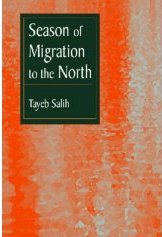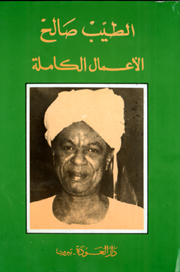Season of Migration to the North A Novel
|
Africa
|
|||||||||||||||||||
|
Anno - Date de Parution |
1967 | |||||||||||||||||||
|
Titolo originale | Season of Migration to the North: A Novel | |||||||||||||||||||
|
Lingua originale | arabo | |||||||||||||||||||
|
Lingua - language - langue | eng | |||||||||||||||||||
|
Ristampa - Réédition - Reprint |
Penguin 2003 | |||||||||||||||||||
|
Traduttore |
Denys Johnson-Davies | |||||||||||||||||||
|
|
||||||||||||||||||||

|
Amazon.com (United States) - order this book Season of Migration to the North: A Novel |
|||||||||||||||||||
|
|
|
One of the classic themes followed in this complex novel, translated from the Arabic, is cultural dissonance between East and West, particularly the experience of a returned native. The narrator returns from his studies in England to his remote little village in Sudan, to begin his career as an educator. There he encounters Mustafa, a fascinating man of mystery, who also has studied at Oxford. As their relationship builds on this commonality, Mustafa reveals his past. A series of compulsive liaisons with English women who were similarly infatuated with the "Black Englishman," as he was nicknamed, have ended in disaster. Charged with the passion killing of his last paramour, Mustafa was acquitted by the English courts. As he unravels his complicated, gory and erotic story, Mustafa charges the listener with the custody of his present life. When Mustafa disappears, apparently drowned in the Nile and perhaps a suicide, another door in his secretive life opens to include his wife and children. Emerging from a constantly evolving narrative, in a trance-like telling, is the clash between an assumed worldly sophistication and enduring, dark, elemental forces. An arresting work by a major Arab novelist who mines the rich lode of African experience with the Western world.
Recensione in lingua italiana |
| The novel charts individuation of the (un-named) narrator, who has returned to his native village in the Sudan having spent seven years in England furthering his education. | ||||||||||||||||
| Biografia | ||||||||||||||||||||
|
A tutt’oggi il grande pubblico europeo non conosce la letteratura sudanese in lingua araba se non attraverso l’opera del celebre autore Tayyib Saleh. Questi pubblicò Dûmat Wad Hamid e ‘Urs az-Zayn – di cui esiste anche l’adattamento cinematografico- ma è il suo romanzo Mawsim al- hijra ila al-shamal (“Stagione di una migrazione verso il Nord”), pubblicato nel 1968, che lo renderà celebre nel mondo arabo, dove la sua opera lascerà il segno nella critica letteraria, e in Occidente, essendo stati tradotti in inglese e francese molti suoi romanzi. Attraverso il racconto del ritorno al Paese di origine dopo un lungo soggiorno in Gran Bretagna, il narratore di “Stagione di una migrazione verso il Nord” e il suo interlocutore trattano numerose tematiche: la vita di un immigrato in Europa e, parallelamente, le difficoltà del ritorno dopo un lungo esilio, la dolcezza apparente della vita rurale, ma anche la condizione femminile e il peso delle tradizioni in Sudan. | ||||||||||||||||||||
| Consulta anche: Scheda della tesi di Alessandra Priore sulla narrativa di Salih Al-Tayyib | ||||||||||||||||||||
| ||||||||||||||||||||





 Season of Migration to the North
Season of Migration to the North
